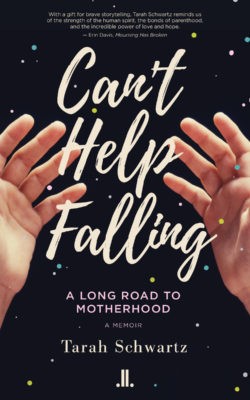Before I had children, I was unaware of the “mamasphere,” a mass of scrappy blogs (and now, polished Instagram accounts) dedicated to motherhood and parenting. In one online group of self-proclaimed parent over-sharers I currently follow, contributors talk openly about almost everything to do with raising kids – sibling room sharing, struggles with bedwetting, and picky eating. Some even share photos of the rashes their children develop, polling whether to call the doctor or not. Yet when the topics of infertility or miscarriage are raised, there is always a content warning that precedes the post. These are traumatic experiences. Even when fertility treatments are successful, the process has its revulsions.
In her memoir, Can’t Help Falling: A Long Road to Motherhood, former broadcast journalist and news anchor Tarah Schwartz opens with a hopeful message in lieu of a warning. “I’m sharing my story about the moments that led me from being lost to finding the kind of love I knew I wanted. I don’t want to imply there are always happy endings, but they do exist.”
When the book begins Schwartz is 38, living in Montreal, and newlywed to husband Enrico, who is by her accounts a prince of a man. “He’s loyal and protective, walking on the side of traffic or picking me up at work if I finish late.” She becomes pregnant, but amniocentesis reveals a fatal issue with the fetus.
Can’t Help Falling Linda Leith Publishing
A Long Road to Motherhood
Tarah Schwartz
$21.95
paper
170pp
9781773901084
The latter half of the book details the many bureaucratic hurdles Schwartz and Enrico jump to adopt from South Korea, but only peeks into the social complexities of international adoption. On the day Schwartz departs Seoul with her adopted son, Sam, she catches a guarded glimpse into the orphanage nursery, which is packed with babies and only a few caretakers. “I pulled Sam back into my arms and thanked God so fiercely in that moment. That from these rows and rows of babies, all aching to be cherished, from those endless beds filled with frightened, fragile souls, my son had been chosen for us.”
The absence of developed supporting characters may mirror the isolation experienced by couples dealing with infertility. Narrative tension is reserved for Enrico, whose resolve only briefly falters. One recurring figure is yoga teacher Antoine – a caricature of his profession – who comforts with platitudes (“If you fight this process Tarah, it will fight you back”). In describing her inner turmoil, Schwartz is also guilty at times of resorting to cliché. Yet as writer Rivka Galchen (whose book, Little Labors, was my postpartum bedside companion) wrote in her 2015 New York Times defense of trite phrasing, “clichés obliquely tell us more than they mean to.” Society-wide silence around infertility has denied a more complex vocabulary for this indescribable agony, so perhaps we can forgive a few canned statements here.
A memoir that borrows from the inspirational genre, Can’t Help Falling opens a door on the shrouded experiences of couples who suffer miscarriages and infertility, and who navigate the uncertainties of adoption. An intimate and companionable read, it may help others find comfort on their long roads to parenthood.mRb






0 Comments